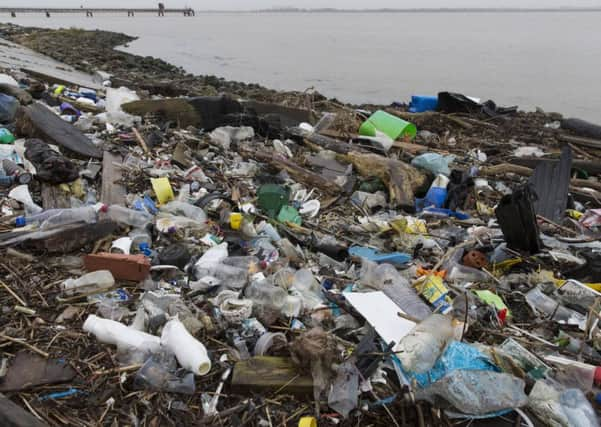A deposit scheme including glass could shatter good intentions – Paul Togneri


Scotland’s breweries and pubs are passionate about reducing their environmental impact – pop into your local and you’ll likely notice paper instead of plastic straws – but there is far more going on behind the scenes.
From driving food and container waste reduction in kitchens, to new, innovative ways to save energy – like Heineken’s smart dispense system, which saves pubs money by reducing both the amount of power they use to keep beer chilled and the water needed to clean lines. We’re not complacent though, more can be done and we recognise it as our duty to continually improve.
Advertisement
Hide AdAdvertisement
Hide AdAs an industry, we are committed to reducing our environmental burden and are also passionate about cleaning up our streets with less litter. The Scottish Government’s decision to introduce a deposit return scheme (DRS) will undoubtedly help towards these ambitions. But we must be careful to ensure that what is delivered truly makes sense and will have a positive impact, both for the environment and the residents of Scotland.


The system as currently envisaged by the Government will not only place a 20p deposit on plastic bottles and aluminum cans, but also now includes glass containers. We fear that the addition of glass will massively increase the cost and complexity of the system and may have a detrimental impact on Scottish pubs and brewers.
Unlike plastic, glass can’t be safely compressed and is from seven to 18 times heavier. This creates hazards for handlers and consumers, while also disproportionately impacting the elderly, low income households and those without cars when travelling to reclaim their deposit under the scheme, whereas now such containers can be safely recycled through kerbside collection.
It also means that the ‘reverse vending machines’ to be installed across the country to facilitate the DRS will need to be far larger and much more expensive. All this means that the Government’s estimated 3.3p producer fee, which will also apply on containers, will be substantially higher for glass products. This will create a cost which will have to be passed on to consumers, meaning the initial cost of a single bottle of beer could increase by as much as 30p.
Whilst an extra 30p on a bottle, 20p of which you get back, might not sound like game-changer, apply that to a multi-pack of 24, and this totals a whopping £7.20! It then begins to hit home how the inclusion of glass might impact people’s pockets, and in turn, the decisions they make when choosing which products to buy. Elsewhere in the world, this challenge may be more manageable, but price increases already in place as result of minimum unit pricing in Scotland exacerbate the issue.
When Minimum Unit Pricing was introduced last year, it set a floor price for alcohol based on the amount of pure alcohol in the product. This effectively banned cheap, high-strength alcohol but this policy outcome risks being undermined through the introduction of a flat-deposit on containers.
For example, a bottle of high-strength vodka will increase by the deposit (20p) plus producer fee (3.3p upwards), but a multipack of low-strength beer will increase by as many as 24 deposits (£4.80) and 24 producer fees (79p plus). Of course, the customer can get the deposit back, but when standing in the alcohol aisle, the reality of having to pay out potentially £5 more for beer or 20p more for a bottle of vodka, may ultimately drive some towards higher strength spirits.
Consumer research has also shown that there is a high likelihood that some people will switch from multi-packs to large plastic bottles as the deposit will be less. When the focus is reducing plastic waste, we need to be careful that this policy does not accidentally drive consumers to use more than before.
Advertisement
Hide AdAdvertisement
Hide AdThe exclusion of glass from the DRS would minimise these issues by eliminating this perceived affordability problem from the system, while also reducing the prospective costs and complexities of administration.
We recognise concerns that once the materials inside the system are set, it may be challenging to expand it at a later date. However, we don’t foresee a situation in the future where the inclusion of glass would be beneficial – if it doesn’t make sense now, there’s no evidence to suggest it will make sense in the future. If we look across the world at the range of DRS systems which exist, a few do include glass, but none have to navigate the challenge of minimum unit pricing.
Hot on the heels of Scotland, the UK Government has also announced its intention to introduce a DRS in England and Wales in 2023. Introducing a joint system, or at the very least compatible systems, would minimise issues for Scottish businesses exporting to the rest of the UK, provide simplicity to consumers and make a greater contribution to the fight against plastic pollution. Climate change doesn’t recognise borders, and any way you look at it, a UK-wide system would make sense for consumers, business and the environment.
As an industry, we will play our part, and look forward to continuing to innovate new ways of minimising our environmental impact. We would like also to continue work with Government to ensure that any countrywide initiatives, such as DRS, achieve their environmental goals in a cost-effective manner, whilst also avoiding unintended consequences which may impact other policy priorities.
Paul Togneri, Scottish Beer & Pub Association.